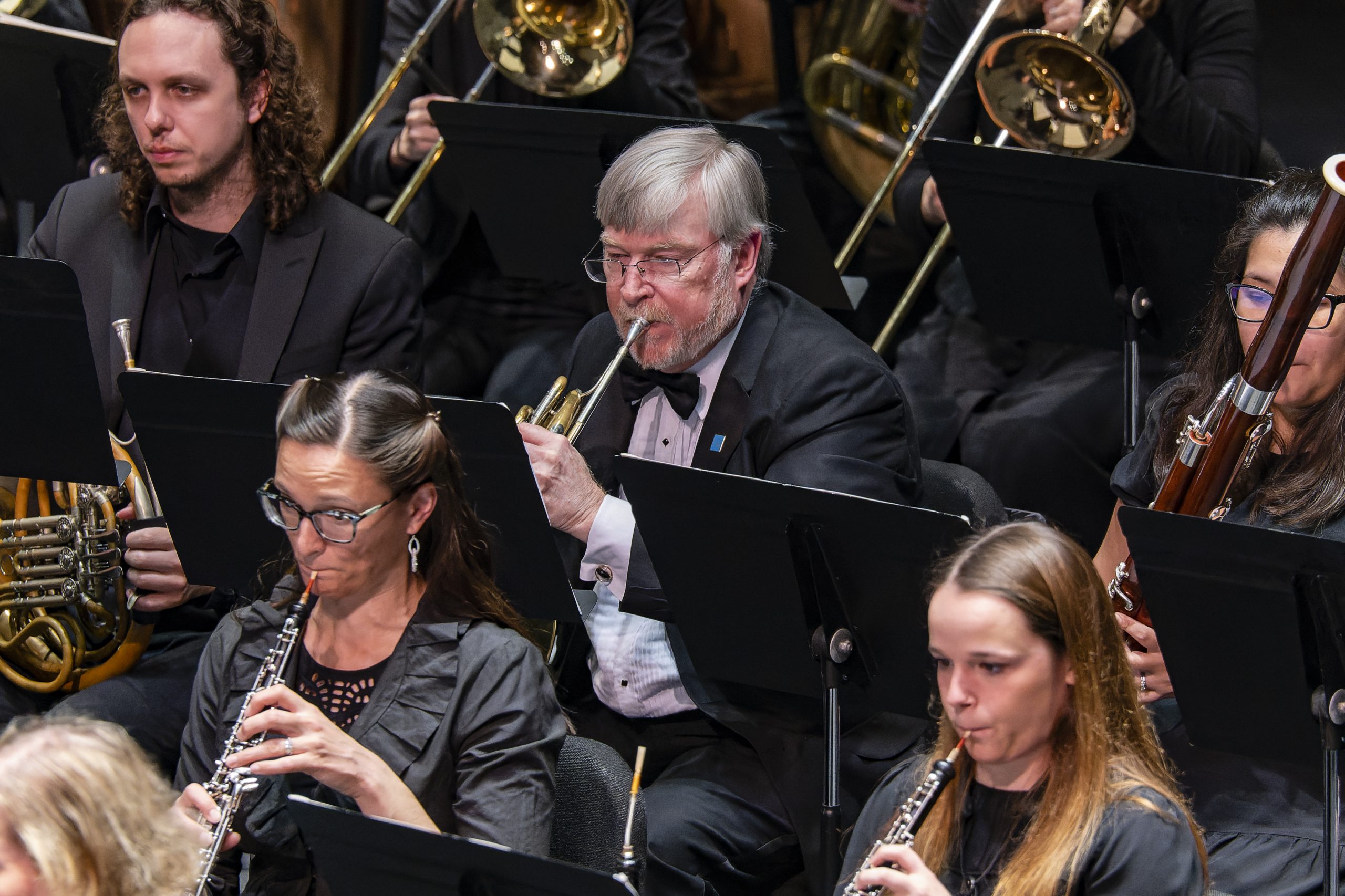
Tell us about how you got started playing music.
I probably didn’t have much of a choice. My mom was a music teacher, which runs back several generations in our family. I was the third of three children, all spaced 3.5 years apart, so I grew up at band concerts and Friday night football games. My sister became a music educator and composer, and my brother a pilot who always brought his pocket trumpet along to practice.
I recently lost my mother at the age of 95, and up until the end, she was still doing weekly sing-alongs at her retirement home, playing the piano. We grew up sort of lower middle-class, but my parents always found the money to make sure we had what we needed. Amazingly, all three of us still play actively, and still on the instruments our parents scraped the money to purchase for us in high school or college.
What’s been your experience like playing with the Fairfax Wind Symphony. What makes this group different from other groups you have played with?
I’m in my 21st (or maybe 22nd) season playing with this group, and I can say it is without doubt the finest group of musicians I’ve ever played with. At the very first rehearsal I could hear, and feel, the warmth of sound coming out of the group. The huge bottom sound of the tubas and low brass, coupled with flutes and clarinets who can balance their sounds together without getting shrill.
I’m in my 21st (or maybe 22nd) season playing with this group, and I can say it is without doubt the finest group of musicians I’ve ever played with.
There’s also the “zone” that this group can get into – that place while playing where everyone is so in sync that we’re playing as a single organism. The entire 2006 Midwest performance, any rehearsal with Arnald Gabriel, and playing “Stages” at VMEA last year, where halfway through the piece the entire band broke down in tears, yet reached so deep into themselves that we pulled off a nearly perfect performance. That’s the zone this group can find. What a joy to partake in that.
You have a different background from most of the members of the Fairfax Wind Symphony which is primarily made up of people with music degrees. Can you tell us more?
I’m a lawyer by profession, and have had a wonderful career in private practice doing telecommunications, computer game, and outer space law. When my girls were in high school in Fairfax County (and somehow, through no fault of mine, becoming horn players), I jumped in with both feet, being the pit boss for marching band, donating my services to do sectionals and coach up solo and ensemble groups, and ultimately serving as band booster president for three years. Along the way I got introduced to Stan and invited to sit in with the group. Now you’ll have to pry my seat out from under me!
What are some things that young musicians starting out on your instrument should know about? What should they focus on if they want to be successful?
I’m still learning into my 60’s! Seriously, I find myself studying more about playing now than I ever did growing up. I just wanted to get through practice to get onto football or baseball practice. I wish then that I had taken the time to study what I was practicing, not just getting the notes under my fingers.
I’ve spent a lot of time listening to the “LA Horn sound” that we’re used to hearing in movies from masters like Vince de Rosa and James Thatcher. That big, big horn sound is what I like and strive for…
It took me years to understand why I never really liked the sound of European orchestras until I studied their horn sections, and the way they played. I’ve spent a lot of time listening to the “LA Horn sound” that we’re used to hearing in movies from masters like Vince de Rosa and James Thatcher. That big, big horn sound is what I like and strive for, rather than the smaller, more controlled style of most European orchestras. That path’s fraught with peril sometimes (given the difficulty of mastering the horn). But find the sound that works for you, and go for it!
What’s in your bag/case?
The typical gear, I suppose. Plus for some reason I’ve managed to collect close to a dozen of the cool lanyards issued by the Kennedy Center when (through contacts at FWS), I played as part of the CAPPIES all-star orchestra for 15 years.
We’re all busy these days. Why do you set aside time to play music?
It’s an absolute must for me. I put my horn aside during law school and several years after that. I got back into music joining my church handbell choir (which I ultimately directed for 25 years), and played a lot of trumpet. Then a piece came up that needed a French horn and I pulled out my horn, dusted it off, blew a few notes, and . . . began to cry like a baby. I hadn’t realized until that exact moment what a gigantic hole there was in my life, and vowed never to put it down again.
Thanks to FWS, and the contacts I’ve made through it, I get to play as much as I can handle, including being part of the Silver 5 brass quintet with Don Witman, Mike Bellinger, Bob Terio, and Nate Simpson (now relocated to Roanoke). It’s part of my DNA, and a wonderful blessing to be able to play as part of the Fairfax Wind Symphony.
If you regularly perform with the Fairfax Wind Symphony and would like to be featured in our Performer Spotlight series please contact us!